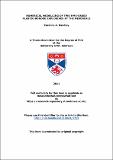Numerical modelling of two HMX-based plastic-bonded explosives at the mesoscale
View/
Date
22/06/2011Author
Supervisor
Funder
Metadata
Show full item recordAltmetrics Handle Statistics
Abstract
Mesoscale models are needed to predict the effect of changes to the microstructure of plastic-bonded explosives on their shock initiation and detonation behaviour. This thesis describes the considerable progress that has been made towards a mesoscale model for two HMX-based explosives PBX9501 and EDC37. In common with previous work in the literature, the model is implemented in hydrocodes that have been designed for shock physics and detonation modelling. Two relevant physics effects, heat conduction and Arrhenius chemistry, are added to a one-dimensional Lagrangian hydrocode and correction factors are identified to improve total energy conservation. Material models are constructed for the HMX crystals and polymer binders in the explosives, and are validated by comparison to Hugoniot data, Pop-plot data and detonation wave profiles. One and two-dimensional simulations of PBX9501 and EDC37 microstructures are used to investigate the response of the bulk explosive to shock loading. The sensitivity of calculated temperature distributions to uncertainties in the material properties data is determined, and a thermodynamic explanation is given for time-independent features in temperature profiles. Hotspots are widely accepted as being responsible for shock initiation in plastic-bonded explosives. It is demonstrated that, although shock heating of crystals and binder is responsible for temperature localisation, it is not a feasible hotspot mechanism in PBX9501 and EDC37 because the temperatures generated are too low to cause significant chemical reaction in the required timescales. Critical hotspot criteria derived for HMX and the binders compare favourably to earlier studies. The speed of reaction propagation from hotspots into the surrounding explosive is validated by comparison to flame propagation data, and the temperature of the gaseous reaction products is identified as being responsible for negative pressure dependence. Hotspot size, separation and temperature requirements are identified which can be used to eliminate candidate mechanisms in future.
Type
Thesis, PhD Doctor of Philosophy
Collections
Items in the St Andrews Research Repository are protected by copyright, with all rights reserved, unless otherwise indicated.

